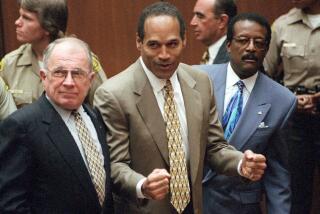‘Fatal’ Author Claims Victory in Settlement
Although a convicted killer gets the money, writer Joe McGinniss claimed Tuesday that he is the real winner in this week’s $325,000 settlement of a suit over his book “Fatal Vision.”
By settling out of court, McGinniss said in his first comments on the affair, he is preventing former Green Beret doctor Jeffrey MacDonald--a convicted triple murderer--from “parading around in court like a TV talk show host” in a second trial of the lawsuit brought by MacDonald. The first trial of the suit, in which MacDonald sought $15 million, ended after seven weeks in a deadlocked jury earlier this year.
McGinniss said he hopes the settlement will at last end his involvement in the celebrated 17-year-old murder case. He added that he also hopes the agreement will silence MacDonald by closing off his last legal avenue of calling attention to himself. All MacDonald’s criminal appeals have been exhausted.
“I don’t know what else is left,” McGinniss said. “Certainly he goes back to three life sentences and therefore money is kind of moot in that he doesn’t get to spend it.
“I just didn’t want to give MacDonald the satisfaction of taking me away from productive work again,” the Williamstown, Mass., resident said in a telephone interview.
The case attracted wide interest in the publishing industry because of its potential implications for writers and publishers.
Tout His Innocence
Settlement of the suit, filed more than three years ago by MacDonald, was announced Monday. The former Army officer and Long Beach doctor charged that he had been duped into believing that McGinniss would tout his innocence in “Fatal Vision” when in fact the book portrays him as a killer.
According to terms of the settlement, McGinniss said, he admitted no wrongdoing and MacDonald essentially dropped his charges against him and the book. Such a settlement, McGinniss said, avoids setting a legal precedent that might entangle other authors.
He conceded, however, that the case may have done some damage anyway.
“Any chilling effect occurs the moment a judge permits a case like this to go forward to trial,” McGinniss said. “A trial is what authors, publishers and editors just can’t handle--the disruption of your life, the time away from work, the ordeal of the whole thing.”
After 49 days in a Los Angeles hotel for the first trial, McGinniss said he began to feel like he was under “house arrest.”
Throughout the long legal battle, McGinniss and his attorneys argued that releases signed by MacDonald--as well as constitutional guarantees of freedom of expression--protected the writer from the “grudge” suit by MacDonald. They also maintained that the suit was a thinly disguised libel action.
McGinniss said he agreed to settle for a variety of reasons. He is completing a new book and could not afford to take time away from it for another trial, he said. Moreover, under terms of the settlement, he himself will not pay any money to MacDonald. Just who will pay the settlement has not been disclosed.
More to Read
Sign up for our Book Club newsletter
Get the latest news, events and more from the Los Angeles Times Book Club, and help us get L.A. reading and talking.
You may occasionally receive promotional content from the Los Angeles Times.







